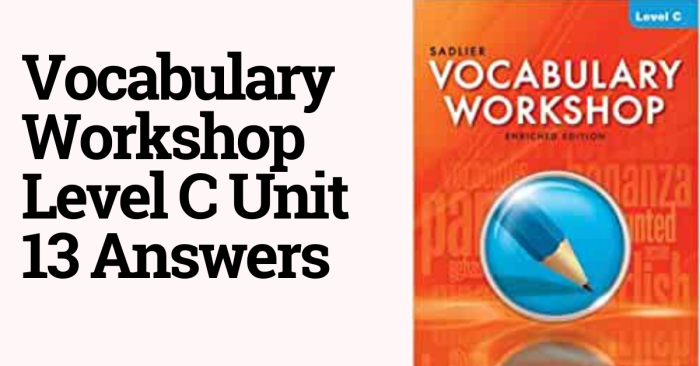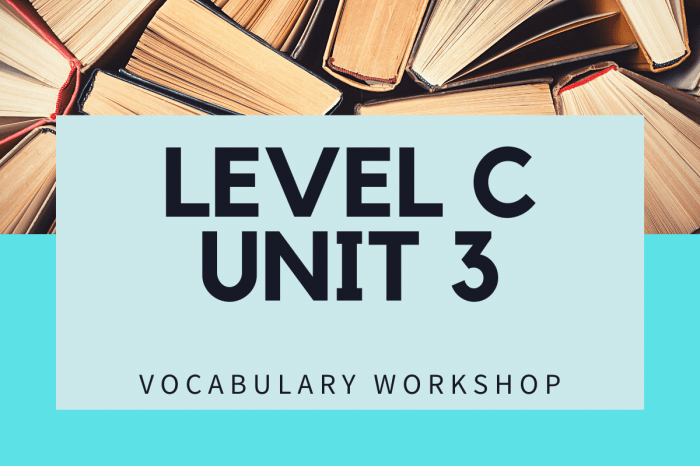Embark on an enriching linguistic journey with Vocabulary Workshop Level C Unit 3 answers, where you will discover the significance of vocabulary in communication and its impact on comprehension, expression, and success in various life domains.
This unit delves into the intricacies of vocabulary building, providing you with effective strategies for expanding your word repertoire and applying it confidently in real-world scenarios.
Vocabulary and its Importance: Vocabulary Workshop Level C Unit 3 Answers

Vocabulary refers to the sum of words known and used by an individual. It plays a pivotal role in effective communication, as it enables individuals to express their thoughts and ideas clearly and comprehend the messages of others. Expanding one’s vocabulary offers numerous benefits, including enhanced comprehension, improved expression, and increased cognitive flexibility.
Vocabulary plays a crucial role in comprehension. When individuals encounter unfamiliar words in texts or conversations, their understanding is hindered. Conversely, a robust vocabulary allows individuals to decipher complex texts, appreciate literary nuances, and grasp the intended meaning of spoken language.
Additionally, vocabulary enhances expression. Individuals with a wide vocabulary can articulate their thoughts and ideas more precisely and persuasively. They are able to select the most appropriate words to convey their messages, resulting in more effective and impactful communication.
Furthermore, vocabulary expansion contributes to cognitive flexibility. It enables individuals to adapt their language to different situations and audiences. They can switch between formal and informal registers, use technical terms in professional settings, and employ colloquialisms in casual conversations.
Unit 3 of Vocabulary Workshop Level C
Unit 3 of Vocabulary Workshop Level C introduces learners to a range of vocabulary related to the theme of “Travel.” This unit aims to enhance learners’ vocabulary in areas such as transportation, destinations, activities, and experiences associated with travel.
The learning objectives of this unit include:
- Expanding vocabulary related to travel
- Improving comprehension of travel-related texts
- Enhancing expression in travel-related situations
The topics covered in this unit include:
- Types of transportation
- Popular travel destinations
- Activities and experiences while traveling
- Planning and booking travel arrangements
Analyzing the Answers
The exercises in Unit 3 of Vocabulary Workshop Level C assess learners’ understanding of the vocabulary introduced in the unit. The types of questions asked include:
- Multiple choice: Learners select the correct meaning of a word from a list of options.
- Fill-in-the-blank: Learners complete sentences by filling in the correct vocabulary word.
- Matching: Learners match words with their definitions or synonyms.
- Short answer: Learners provide brief answers to questions about the vocabulary.
To solve the exercises effectively, learners should:
- Read the instructions carefully.
- Review the vocabulary words and their meanings.
- Use context clues to determine the meaning of unfamiliar words.
- Eliminate incorrect options based on their understanding of the vocabulary.
- Check their answers against the answer key.
Examples and Explanations
Here are some specific examples of vocabulary words from Unit 3 of Vocabulary Workshop Level C:
- Destination:A place to which one travels
- Itinerary:A plan of a journey, including the route and destinations
- Accommodation:A place to stay, such as a hotel or hostel
- Excursion:A short trip or outing, especially one made during a vacation
- Landmark:A well-known building, monument, or other feature of a place
These words are essential for understanding and communicating about travel. They allow learners to describe their travel plans, share their experiences, and ask for information while traveling.
Tips and Techniques

Here are some tips for improving vocabulary retention:
- Read widely:Reading exposes learners to a wide range of vocabulary. Learners should read books, articles, and other texts on a variety of topics.
- Use flashcards:Flashcards are a great way to memorize new words. Learners can write the word on one side of the card and the definition on the other.
- Play word games:Word games, such as crosswords and Scrabble, can help learners practice their vocabulary in a fun and engaging way.
- Use a dictionary:Learners should keep a dictionary handy and use it to look up unfamiliar words. They should also make a note of the definitions so they can remember them later.
Here are some techniques for practicing vocabulary regularly:
- Use new words in conversation:Learners should make an effort to use new words in their conversations with others.
- Write regularly:Writing is a great way to practice vocabulary. Learners can write about their experiences, thoughts, and ideas.
- Set vocabulary goals:Learners should set realistic goals for themselves, such as learning a certain number of new words each week.
Real-World Applications

The vocabulary learned in Unit 3 of Vocabulary Workshop Level C can be applied in a variety of real-world situations, including:
- Planning a trip:Learners can use the vocabulary to plan their itineraries, book accommodations, and research destinations.
- Traveling:Learners can use the vocabulary to communicate with locals, ask for directions, and describe their experiences.
- Sharing travel stories:Learners can use the vocabulary to share their travel stories with others.
- Academic and professional settings:Learners can use the vocabulary to write essays, reports, and presentations about travel.
Expanding vocabulary is essential for effective communication and success in academic, professional, and social contexts. By learning the vocabulary introduced in Unit 3 of Vocabulary Workshop Level C, learners can enhance their ability to communicate about travel and broaden their understanding of the world.
Commonly Asked Questions
What are the key vocabulary words addressed in Unit 3?
Unit 3 focuses on expanding your vocabulary in areas such as emotions, relationships, and abstract concepts.
What types of questions are asked in the exercises?
The exercises include multiple-choice questions, fill-in-the-blanks, and sentence completion tasks to test your understanding and application of the vocabulary.
How can I improve my vocabulary retention?
Regular practice, spaced repetition, and using vocabulary in real-life situations are effective strategies for improving vocabulary retention.